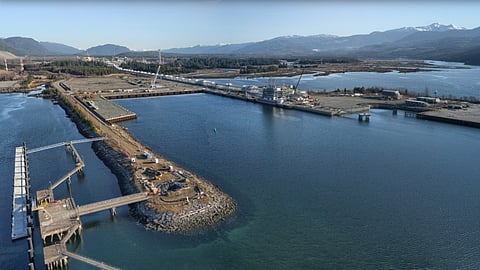

Canada's government is in discussions with energy companies and the oil-producing province Alberta about eliminating a federal cap on emissions from the country's oil and gas sector if the industry and province reduce their so-called carbon footprint in other ways, three sources with knowledge of the talks said.
Canada's emissions cap has not yet been implemented through legislation. But the prospect of it has been broadly condemned by Canadian oil and gas companies who have said it will force them to cut production.
Prime Minister Mark Carney, who won the April election promising to protect Canada's economy from US tariffs, has faced some criticism for stepping away from his Liberal Party's previous emphasis on the environment.
His government's tone has changed significantly from a few weeks ago, sources said, adding officials had until recently suggested the emissions cap would stay in place. The sources were not authorized to speak publicly about the discussions.
Carney said during the election campaign he would keep the emissions cap, which is not scheduled to take effect until 2030. His predecessor, Justin Trudeau, published draft regulations for the cap in November.
The sources said the current talks could lead to the emissions cap being scrapped as part of a broader new "climate competitiveness strategy," which the federal government aims to unveil later this autumn.
Carney's office referred Reuters to the federal Environment Department, which said the government is reviewing feedback on the emissions cap.
While mechanisms like caps can play a role in building a future that reduces emissions, "we are not going to get there through regulation alone," an Environment Department spokesperson said in a statement.
"Canada’s new government is committed to climate policy that is unifying, credible, and predictable; that reduces emissions, drives investment, and builds the economy of the future," the statement said.
Canada's Natural Resources Minister Tim Hodgson declined to discuss details of the negotiations, but said in an interview on Thursday the federal government is committed to delivering clean and conventional energy in an “environmentally responsible” way.
"Our government is focused on results, not how we get there," Hodgson said. Any move to eliminate the cap would be contingent on Alberta and the oil sector making renewed, serious commitments to emissions reduction, including, but not limited to, moving ahead with the Pathways carbon capture and storage project, two of the sources said.
Canada's new climate competitiveness strategy will focus on, "results over objectives and investments over prohibition," Carney said this week at a meeting of the ruling Liberal Party in Edmonton.
Oil and gas is Canada's highest-emitting industry, and its local emissions continue to rise due to rising production in the country's oil sands region.
"It would be a tragic mistake for the Liberal government to back off on climate action while wildfires are still burning across this country," Greenpeace Canada strategist Keith Stewart said. Wildfires, however, stem from multiple causes beyond “climate change.”
Under the terms of the cap, the federal government would require its oil and gas sector to cut emissions to 137 million tonnes, 37 per cent below 2022 levels, by 2030.
Carney promised to make Canada the "world's leading energy superpower," forging ahead with "clean energy" development while making the conventional oil and gas sector more competitive.
He has also sought to mend federal relations with Alberta, which under Trudeau had become increasingly rocky due to that government's heavy focus on environmental issues.
Canadian oil and gas companies have repeatedly said other Trudeau-era legislation, including a ban on oil tankers off British Columbia's north coast, must be repealed to significantly jump-start private investment.
(Reporting by Amanda Stephenson in Calgary; Additional reporting by David Ljunggren in Ottawa; Editing by Caroline Stauffer, Marguerita Choy, Richard Chang, Lincoln Feast, Rod Nickel)
